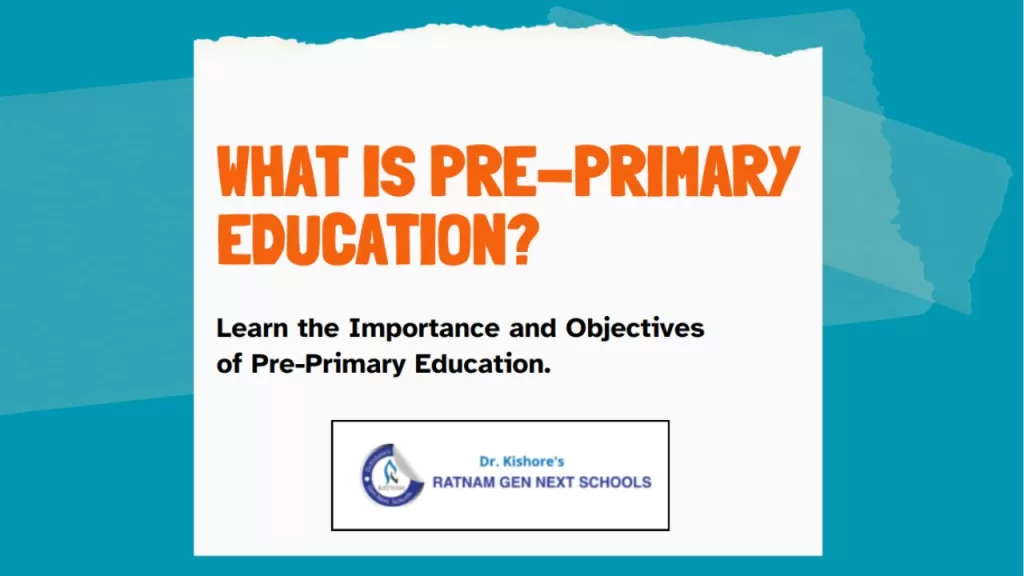The start of a child’s academic life is in Pre-primary Education also called pre-primary school or early childhood education. It typically caters to children between the ages of 3 to 6 years old, depending on the country or educational system preparing them for formal schooling. This period is very crucial considering that it involves all round aspects of growing by preparing them not only for academics but also emotionally, socially and physically.
For a great start in your child’s education, consider Dr. Kishore’s Ratnam Schools. They focus on creating a caring and engaging environment for young kids. With their dedication to early childhood education, you can be sure your child will get the best foundation for their future.
Also Read: What is Primary Education, Importance, and Objectives
Importance of Pre-Primary Education
Let’s take a look at some of the major importance of pre-primary education that will give you an idea of why pre-primary education is good for your children.
1. Achieving Early Developmental Milestones
Pre-primary education plays a pivotal role in achieving early developmental milestones. Children at this age are like sponges, absorbing knowledge and skills rapidly. Structured learning environments help in nurturing their cognitive abilities, language skills, and creativity.
2. Learning to Get Along with Others
Interacting with peers and teachers in a pre-primary setting teaches children valuable socialization skills. They learn how to share, communicate effectively, and work collaboratively—a foundation for building healthy relationships later in life.
Also Read: Best Qualities of a Good Student
3. Helping Kids Grow Emotionally
Emotional development is fostered through supportive interactions with caregivers and peers. Children learn to manage their feelings, develop empathy, and build self-confidence, which are essential for their overall well-being.
4. Getting Ready for School
Pre-primary education prepares children for the transition to formal schooling. It introduces basic concepts of numeracy, literacy, and problem-solving playfully, making learning enjoyable and engaging.
Also Read: Best Hobbies to Keep Mind Sharp & Active
5. Identification of Special Needs
Early childhood educators are trained to identify developmental delays or special needs early on. Timely interventions can significantly improve outcomes for children, ensuring they receive the support they need from the outset.

Objectives of Pre-Primary Education
Pre-primary education helps young children grow and learn by focusing on their thinking, social, and emotional skills. It creates a fun and engaging environment that encourages kids to be curious and love learning.
1. Supporting All-Around Development
The primary goals of pre-primary education are to safeguard the holistic development of children through cognitive, social, emotional, and physical domains. This way, youngsters can acquire social skills, coordinate their movements, solve problems, etc., using manipulation and role-playing games. This integrated system gives the best quality base for life-long studying and self-improvement.
2. Learning by Having Fun
Play-based learning is highly emphasized in pre-primary education. It promotes kids’ adventurous nature that leads to an exploration and experimentation process during practical activities. In learning situations, children think critically whereas they are doing fun things at the same time. Through playing, children get motivated to be more curious and creative hence, they think more deeply. This means that such an appealing way will not only help them get prepared academically for school life but also create in them a likable feeling of studying.
Also Read: Qualities of a Good English Teacher
3. Learning That Fits Each Child
In accepting that each child is distinct, pre-primary education provides specific learning opportunities based on a range of learning styles and capabilities. When teaching, teachers change their method of teaching and the things they use to recognize the existence of different strengths and preferences among a lot of children so that everyone develops well and learns more.
4. Getting Ready for Primary School
Pre-primary education helps students prepare for attending primary school by giving them necessary literacy, numeracy, and life skills. During guided exploration and structured learning activities, children form basic knowledge foundations and learn to positively view the process of acquiring new knowledge. Thus, this makes them more confident and ready to perform in a system with more rules.
Also Read: 15 Life Skills Activities for KIds
5. Parents Getting Involved
Pre-primary education values parental involvement as integral to a child’s educational journey. Parents are encouraged to participate in school activities, engage in discussions about their child’s progress, and support learning continuity between home and school. This partnership fosters a supportive environment where parents and educators collaborate to promote the child’s development and well-being.
Also Read: 10 Activities to Encourage Curiosity in a Child
Conclusion
In conclusion, pre-primary education sets the stage for a child’s future academic success and personal development. It goes beyond mere preparation for school by nurturing young minds in a safe, stimulating environment. Investing in quality early childhood education yields lifelong benefits, ensuring that every child has the opportunity to reach their full potential.


